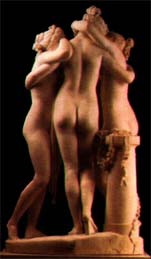The Three Graces

La Danza delle libellule
Music by Franz Lehár:
English Book and lyrics by Ben Travers
Originally "La Danza delle libellule"
Empire Theatre, London 1924 (3 months
The pre-history of this piece is rather curious. In the middle of the first world war, Lehár wrote one of his most decidedly unsuccessful operettas, Der Sterngucker (The Star Gazer) to a libretto by the brilliant and young author, Fritz Löhner (aka Beda), and it was only the fact that some of its music appealed to an Italian producer, Carlo Lombardo, that Lehár was persuaded to reuse much of its music, setting it to a new book partly written by Lombardo, which became Der Libellentanz. The story line may have been Lombardo's own invention. It was first performed in Milan in September, 1922, and was subsequently given an English translation by the well-loved playwright, Ben Travers: but its most enduring success has been, and still is, in Italy, under the title
"La Danza delle libellule"
Story:
M. Piper has bought a castle at Nancy: he invites friends to skate in the park and then to perform, in the castle's theatre. a play he has written. His friends Gratin, the hotelier, and Pommery the champagne-maker have flirtatious wives who, all ex-chorus girls, are good friends with Hélène, the young widow Clicquot.
When Charles (Duke of Nancy, but dressed for hunting and calling himself 'Mr. Nimrod') arrives, he gets on famously with Hélène. Bouquet. a Parisian actor engaged for the play, arrives and immediately interests Toutou (the hotelier's wife), who tells her friends about her appetite for love. Because Charles appears indifferent to tier charms. Toutou says he must leave her hotel: Bouquet's flirting is more to her liking. General consternation that Charles is being thrown out, but he is unruffled and promises to attend the play in evening dress, as the Duke himself may be coming .. . ....
In the theatre, 'Mr Nimrod's' scandalous behaviour is discussed and on arrival he is put under 'house arrest'; he is forced to declare his identity and, after general apologies, is offered the role of Adonis in the play. Hélène, who is Venus, is desperately trying to conceal her attraction to Charles by avoiding him, but finally they try a scene together. Several more scenes are rehearsed to comic effect, including Toutou and Bouquet's duet and later their well-known 'Apache' song. Though mutually attracted, Charles and Hélène quarrel violently; Piper eventually asks him to leave, but Charles calmly produces a court order, restoring all his property to him, and the others have to leave instead!
In Act 3, Charles has sent a message via Bouquet (now his secretary) that 'Adonis awaits his goddess for tea!" Hélène comes, ostensibly to prevent Toutou or Charlotte turning up, but really because she is now in love with Charles. They meet, but part yet again; Toutou and Bouquet have a flirtation while trying unsuccessfully to escape the moonlight and then, after much confusion and complication, Charlotte and Toutou are reunited with their husbands, and Charles and Hélène finally find one another.
Principal Songs:
Dared I Say
My Romance
Three Graces
All That Is Mine
Snow Song
Dear Home
Turn Fate, Turn
Natural History
Gigolette
Bambolina
Poor Old Love
Bouquet
Principals:
3 female, 2 male, SATB Chorus
Sets: 3
Orchestra:
2122/323/Percussion/Harp/Strings